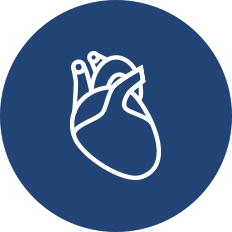ROOM MONITORS AND TELEMETRY
If you are in the Intensive Care Unit or the Telemetry Unit, electrocardiographic (EKG) electrodes (sponge pads) will be placed on your chest. The EKG electrodes will be connected to a monitor. The monitor gives the nurses and doctors a continuous picture of your heart’s electrical activity – information that helps plan your therapy. The EKG electrodes are very sensitive, so don’t be frightened if your movement activates the monitor’s alarm. This is a safety feature that alerts physicians and nurses regarding any significant changes in the rate or rhythm of your heart beat. A Holter monitor may also be ordered by your physician. This monitor is worn by the patient and retains a constant record of your heart rhythm on a tape recorder.
ELECTROCARDIOGRAM (EKG)
An electrocardiogram (EKG) gives an electrical “picture” of how your heart is working. The test requires only that you lie still while the technician puts electrodes (sponge pads) on your chest. The test takes about five minutes. (Preparation for electrocardiogram: None)
NUCLEAR MEDICINE STUDIES
(HEART SCANS)
A cardiac nuclear scan is a special type of picture in which a small amount of radioactive material is injected into a vein, following which a special camera and computer make pictures of the heart. Pictures will be taken before and after exercise. You are connected through electrodes and your heart will be monitored during exercise.

TECHNETIUM PYROPHOSPHATE SCAN

WALL MOTION TEST

THALLIUM SCAN
The procedure may take about 2 – 3 hours and sometimes it is necessary to take further pictures of the heart 4 hours and 24 hours after the initial picture-taking session.
PREPARATION FOR NUCLEAR STUDIES:
- Some medications may be withheld.
- Nothing to eat or drink for 8 hours before the test if the test is combined with a stress test. This may not be necessary if the test is being done in a resting state. You will receive instructions from our office prior to taking the test.
- Wear good walking shoes (if combined with a stress test).
- If you are pregnant (or suspect that you might be pregnant), let your physician or nurse know; such a test should not generally be done on pregnant patients.
DURING THE NUCLEAR MEDICINE TEST, IT IS IMPORTANT TO LET THE PHYSICIAN OR NURSE KNOW IF YOU HAVE:
- Any unusual feelings in the chest, arms, neck, jaw or back.
- Severe fatigue.
- Lightheadedness or dizziness
- Shortness of breath
GENERAL INFORMATION
IT IS THE NATURE OF OUR PRACTICE TO MAKE EMERGENCIES OUR PRIORITY.
On occasion, it does happen that our physicians have to handle emergencies and thus cause the appointments to run behind. Please understand that we will do our best to get to you in a timely manner. In the event that a physician is late and there will be a substantial wait time, our office staff will give you updates as to when the physician will arrive.
If you are diabetic, please bring food with you in the event that you have to wait for your appointment.
Family members may wait in the room with the patient or in designated waiting areas.
